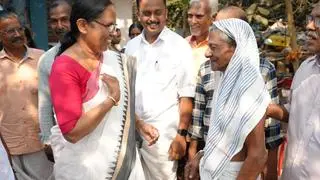The government on Friday assured in the Supreme Court that it will not take any criminal action for possessing demonetised notes beyond December 30, 2016 against those who have approached the apex court.
These petitioners had approached the SC urging for an extension of the deadline to deposit demonetised notes in their possession.
Appearing before a Bench led by Chief Justice of India Dipak Misra, Attorney General K.K. Venugopal reassured the petitioners, but added that protection against criminal action would only extend to the demonetised money they have specifically mentioned in their petitions before the Supreme Court.
They cannot claim protection for other amounts they may possess, the government clarified.
The petitioners, which include farmers from Maharashtra to the hospitalised and overseas citizens, urged the Supreme Court to direct the government to extend the deadline.
However, the Bench said the demonetisation law is still constitutionally valid and the court cannot grant them any interim relief against the law.
The court allowed them to be impleaded before a Constitution Bench which will go into the very validity of the demonetisation law, saying they can address their grievances before that Bench.
Lawyers representing the petitioners argued that they have been deprived of their “hard-earned money” without due prior notice.
“The Prime Minister had promised an extension of the deadline for deposit of demonetised notes. We want to give back to the RBI. We are talking about amounts like ₹1 lakh that we want to deposit and not crores,” advocate Pranav Sachdeva submitted.
The Centre has remained firm about not extending the deadline. It has already told the Supreme Court that it had taken a conscious decision to not give any grace period for citizens to deposit their demonetised notes after the cut-off date of December 30, 2016.
Doing so would have defeated the very purpose of demonetisation, the government said.
The government was replying to the Supreme Court's strident appeal to open a window for genuine people, like the terminally-ill and invalids, to name a few, who were unable to deposit their demonetised ₹ 1000 and ₹ 500 notes between November 9 and December 30 of last year.
Noting that these people had over 51 days for these people to deposit and exchange their old notes for the new currency through multiple outlets, the NDA government had filed an affidavit filed through the Ministry of Finance, saying that now there exists “no necessity or any justifiable reason” to provide them a “grace period” till December 30, 2017, as many petitioners have sought in a bunch of petitions before the Supreme Court.
The government contended that the introduction of The Specified Bank Notes (Cessation of Liabilities) Ordinance, 2016 was a major economic step. The ordinance overrode the assurances of a grace period given by the RBI notification issued on demonetisation eve.
The government said demonetisation lay bare the under-current of black money crippling the country. Income tax raids from April 2014 to February 28, led to the admission of undisclosed income of over ₹ 36,051 crore along with undisclosed assets worth ₹ 2,890 Crore. Similarly, the Income Tax department conducted more than 15,000 surveys which resulted in detection of undisclosed income of more than ₹ 33,000 crore.
On December 16, 2016, the Supreme Court had ordered the formation of a five-judge Constitution Bench to test the constitutionality of the November 8, 2016 demonetisation notification and the legality of the implementation of the policy.
The Supreme Court had said that the issue of demonetisation was of public importance and has far-reaching consequence, requiring a Constitution Bench to hear the petitions challenging the policy.
The court had framed a series of nine questions for the Constitution Bench to decide on:
1. Whether the RBI notification of November 8, 2016 is ultra vires Section 26 (2) and other relevant provisions of the RBI Act, 1954?
2. Whether the notification is violative of Article 300A (right to property) of the Constitution?
3. Whether the notification is ultra vires Articles 14 and 19 of the Constitution?
4. Whether limited withdrawal of one’s own money caused by demonetisation is a violation of Articles 14, 19, 20 and 21 of the Constitution?
5. Whether the implementation of the notification is in substantive and procedural violation of the law of the land?
6. Whether Section 26(2) of the RBI Act is itself a piece of excessive delegation of legislative powers?
7. What is the scope of judicial review into a fiscal and economic policy of the government?
8. Can political parties file writ petitions in the Supreme Court under Article 32 of the Constitution?
9. Were DCCBs subjected to discrimination when they were stopped from accepting deposits and allowing withdrawals?







Comments
Comments have to be in English, and in full sentences. They cannot be abusive or personal. Please abide by our community guidelines for posting your comments.
We have migrated to a new commenting platform. If you are already a registered user of TheHindu Businessline and logged in, you may continue to engage with our articles. If you do not have an account please register and login to post comments. Users can access their older comments by logging into their accounts on Vuukle.